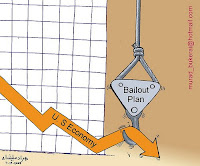 In class we defined a self-made man as someone who struggled through adversity, and despite his obstacles found a way to persevere. He is a rarity, and through self-reliance and determination was able to find extreme success. These men include Bill Gates, Michael Jordan, Chris Gardner, and our new president-elect Barack Obama.
In class we defined a self-made man as someone who struggled through adversity, and despite his obstacles found a way to persevere. He is a rarity, and through self-reliance and determination was able to find extreme success. These men include Bill Gates, Michael Jordan, Chris Gardner, and our new president-elect Barack Obama.Barack Obama didn't have the privileged childhood lifestyle similar to most U.S presidents. He wasn't born into money. First of all, Obama's biological father wasn't really in the picture. He moved back to his home country, Kenya, when Obama was very young. He then died in 1982, having only seen his son once since his move.
Obama also had a hectic upbringing. He was born in Honolulu, Hawaii. He then moved to Indonesia with his mother and new stepfather. After that, Obama moved back to Hawaii. All of this travel took place before Obama was ten years old. When he returned to Hawaii he came without his parents. He lived with his Grandparents while his mother stayed with her new husband in Indonesia. He lived with his grandparents from 5th all the way through high school. Even with his grandparents for support, high school was still tough. He struggled with drugs such as cocaine and marijuana. His mother returned to Honolulu in 1994. She then died in 1995 of Ovarian Cancer. Obama had a hectic childhood, and it was far from easy.
Even with these obstacles Obama was able to reach success. He was able to graduate from high school, and then went on to study at Occidental College in Los Angeles. Two years later he transferred to Columbia University in New York. He built his way up, and he later graduated from Harvard Law School. At Harvard he was elected president of the Harvard Law Review. He was the first black man to be president of the review. After law school, Obama was elected into the Illinois Senate in 1995. After much hard work, he became the Illinois State Senator in 2005. He built his way up. He created extraordinary credentials for himself. He was able to learn and educate himself to prepare for probably the most important campaign of his life. This was his campaign for President of the United States of America.
Barack Obama is a self-made man who rose above his challenges to become the man he is today. We are lucky  to have a president, and a role model that can inspire people across the country. Obama offers a sense of hope that it can get better for all who are struggling. Things can change, and we can make it happen.
to have a president, and a role model that can inspire people across the country. Obama offers a sense of hope that it can get better for all who are struggling. Things can change, and we can make it happen.
 to have a president, and a role model that can inspire people across the country. Obama offers a sense of hope that it can get better for all who are struggling. Things can change, and we can make it happen.
to have a president, and a role model that can inspire people across the country. Obama offers a sense of hope that it can get better for all who are struggling. Things can change, and we can make it happen. 
